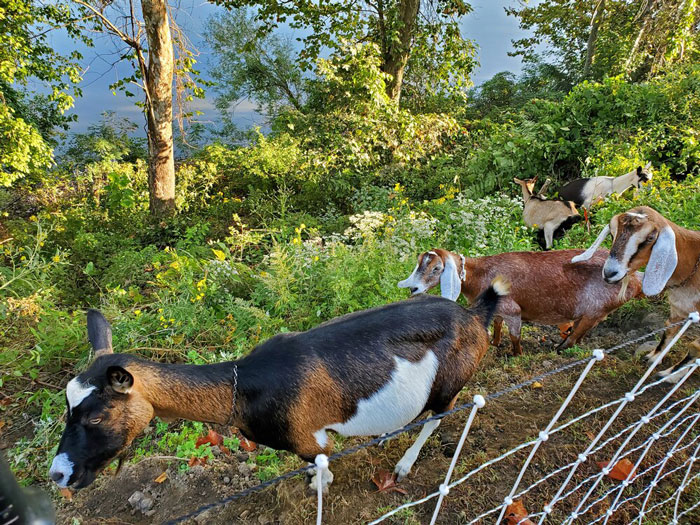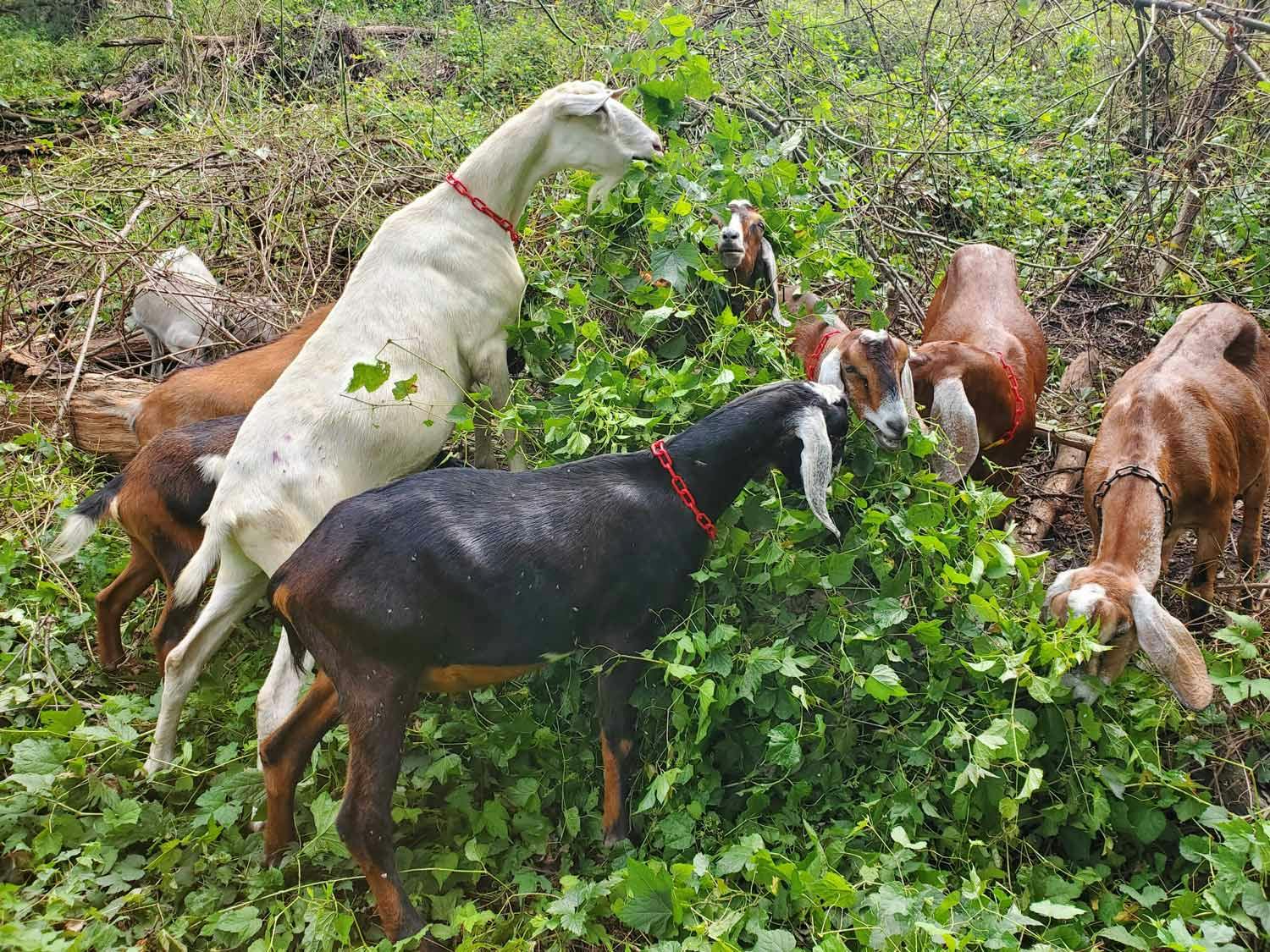Who Controls Invasive Species in Pittsburgh Parks? Goats!
The grazing animals' appetite for weeds is helping restore native bird habitat.
At Frick Park in Pittsburgh, PA, goats do the landscaping.
A donkey leading a herd of hungry goats isn’t what you’d expect to stumble upon when visiting an urban green space. But at Frick Park in Pittsburgh, PA, that’s exactly what you’ll find. Walking along one of the many trails through the wooded sections of the park, you’re likely to come across about a half dozen wide-eyed goats meandering through the forest, their lips smacking as they diligently graze.
But these bearded barnyard animals aren’t there to entertain park users. They are employed by the city’s public works department. The goats have been brought by local company Allegheny GoatScape to chow down on invasive plant species that have spread throughout the park.
Robin Eng, the Pittsburgh Parks Conservancy ecological restoration manager, says the goats are helping to clear land that is “prime real estate” and would be better used by native plant species.
The goats’ quiet munching is a welcome alternative to loud equipment.
The herd’s hard work comes with rewards. Using the goats to eliminate unwanted vegetation is more environmentally friendly than herbicides, and they are fuel-efficient: the only thing they need to keep going are the plants they are actively eating. Plus, their droppings leave rich nutrients for the soil. Their quiet munching is also a welcome alternative to loud equipment, and they’re cheaper to hire than humans.
“There are a lot of areas [in the park that need clearing] that employees just have difficulty getting access to,” says Eng. “In addition to the growth being unruly, we often don’t have the manpower for effective upkeep. With the goats efficiently and easily maneuvering over difficult terrain, it is the perfect management tool for our invasive plant problem.”
While it may seem like an unusual urban parks project, the idea of implementing “goatscaping” isn’t an entirely new concept. Cities like San Francisco, Ann Arbor, MI, and Richmond, VA, have been using goats to help beautify and care for common spaces in urban areas.

Goats graze along the riverside in the Great Allegheny Passage, one of Allegheny GoatScape’s multiple project locations.
Early days
Before becoming involved with parks, Allegheny GoatScape was called Steel City Grazers, and offered its herd for hire on private lands. In 2017, the company transitioned to a non-profit model and moved to a small plot of land in South Side Park, located in the hilly residential neighborhood of South Side Slopes. The herd was engaged to clear the overgrown vines and other invasive plants that had been strangling native trees on the steep slopes of the park.
The goats performed incredibly, and Gavin Deming — who is now the executive director of Allegheny Goatscape — was immediately smitten with the idea of putting the goats to work in other urban greenspaces with the same issues. At the time, Deming was working with the Western Pennsylvania Conservancy, but saw the potential in goat landscaping for the city. After volunteering with the goats, he took on the director role in 2017.
What began as a yearly agreement with the city of Pittsburgh for the goats to clear small public green spaces, was replaced with a five-year contract in 2018. A grant through the Pittsburgh Parks Conservancy brought the goats to a forested area within Frick Park, where the herd was tasked with eliminating honeysuckle to make way for bird habitat restoration.
Restoring bird habitat in Frick Park
Today, Deming’s herd at Frick Park is made up of about a dozen goats who enjoy eating the abundant, invasive honeysuckle. And their work is having a positive effect on the local bird population.
Honeysuckle berries aren’t good for birds — but they love them. “Honeysuckle is like the McDonalds of bird food,” Deming says. “It’s prevalent but not the most nutritious.”
Frick is one of the best locations in the city of Pittsburgh to watch birds because of the density of trees and diversity of vegetation. Restoring more habitat will only make it better. Research has shown that North American bird populations are in decline, and habitat loss is the number one reason for the decline.
The goats easily maneuver difficult terrain, so they’re perfect for managing the invasive plant problem.
At Frick Park, a multi-faceted group of researchers are tracking how the goats may be affecting the local bird population. Under the umbrella of the Allegheny Bird Conservation Alliance, the project is a partnership between the Pittsburgh Parks Conservancy, the Carnegie Museum of Natural History, and the Western Pennsylvania Conservancy. University of Pittsburgh professors are also involved in monitoring plant health, and the group is using citizen science initiatives such as the eBird app, which allows visitors to log bird sightings.
High demand for goats
Frick is not the only location where these Pittsburgh herds roam. They are also working on about 20 other projects on city land throughout the city. In 2021 they were fully booked, and had a waiting list for their services.
The goats focus on certain “hot spots” within a park that are covered in overgrown bushes, vines or invasive species. Notably, as Allegheny GoatScape’s website warns, they aren’t good lawn mowers for the grass.
Once a herd is booked for a job, staff from the organization set up a fence to contain the goats and within those bounds, and they put up a shelter where the goats can rest.
“The herd arrives at the site and immediately goes to work eating the vegetation,” reads the nonprofit’s website. “The humans of Allegheny GoatScape ensure the goats have what they need each day.”
During Halloween and Christmas, the goats get old pumpkins and trees as a special treat.
Once the goats eat through the plants on the site, they are whisked off to their next location. Then, humans can come in and replant native species as needed. The process can be repeated in the same location, year after year, until the invasive plants are eliminated or under control.
In the winter the goats take a rest. They return to work when the weather breaks in the spring. In addition to being roving Weedwackers, they are also seasonal eaters. During Halloween and Christmas, the organization will accept old pumpkins and Christmas trees, which the goats eat as a special treat.
The goats have developed somewhat of a following, making the community aspect of the project an unforeseen bonus.
“The goats bring something special to the park,” says the parks conservancy’s Eng. “There have been benefits outside of the simple practicality of the project.”
During the pandemic, parks have been a particularly popular place of respite for Pittsburgh residents. Deming has been happily surprised to overhear park users who happen upon the herd say, “This makes my day.”
